Promising TAVR Reports From Medtronic, Edwards, St. Jude

Medtronic and Edwards Lifesciences both presented results from recent transcatheter aortic valve replacement (TAVR) clinical trials at the recent Annual Scientific Session of the American College of Cardiology (ACC). Medtronic’s study showed that all-cause mortality rates of high-risk patients using its CoreValve TAVR system were below rates for patients undergoing open heart surgery. Edwards Lifesciences also reported low all-cause mortality rates for its TAVR device, SAPIEN 3, in both high- and intermediate-risk patients.
Last year, Medtronic’s CoreValve received accelerated approval from the FDA, circumventing the need for an independent device advisory panel review, because it demonstrated results superior to open heart surgery in its one-year comparative study.
At the ACC conference this week, Medtronic presented results from a two-year study that showed similar advantages of CoreValve over surgical aortic valve replacement (SAVR). The rate of all-cause mortality was 6.4 percent lower in TAVR patients versus SAVR patients (22.2 percent versus 28.6 percent), and the rate of stroke was also significantly lower, according to a Medtronic press release.
“In this trial, CoreValve maintains a low and stable stroke rate and the recovery advantages CoreValve demonstrated at one year are maintained at two years” said Michael Reardon, a cardiothoracic surgeon at Houston Methodist DeBakey Heart & Vascular Center and chairman of the CoreValve trial.
Reardon stated that, in his opinion, TAVR should be considered the standard of care for high-risk aortic stenosis patients. Currently, TAVR is only approved for high-risk patients, but that may soon change.
Also at ACC, Edwards Lifesciences announced promising 30-day outcomes from the first study of a TAVR device in intermediate-risk as well as high-risk patients. A clinical study of SAPIEN 3 found low all-cause mortality rates and low incidence of stroke and paravalvular regurgitation.
“With average ages in the 80s, the high-risk and intermediate-risk patients in the study had strikingly low mortality rates of 2.2 and 1.1, respectively, despite predicted 30-day mortality that was much higher. Additionally, the rates of significant paravalvular leaks were low in both cohorts — 3.0 for high risk and 4.2 for intermediate — which represented meaningful improvements over prior studies with earlier generation devices,” said Susheel Kodali, director of the Heart Valve Program at Columbia University Medical Center, in a press release.
The first-generation SAPIEN device passed U.S. regulatory inspection in 2011. Pending FDA approval, Edwards plans to launch SAPIEN 3 in early 2016.
St. Jude Medical also announced positive TAVR-related news recently. European sales and U.S. studies of The company's first TAVR device, Portico, had been on hold since last September, when the company discovered concerning unexplained motions in the valve’s leaflets.
After further study, however, the company and outside experts are confident that the movement is not causing any adverse complications for patients, the Minneapolis Star Tribune reports. St. Jude confirmed that its CE Mark for Portico has been reinstated, and the company is working with FDA to resume clinical studies for the device.
Image credit: SAPIEN 3, Edwards Lifesciences
